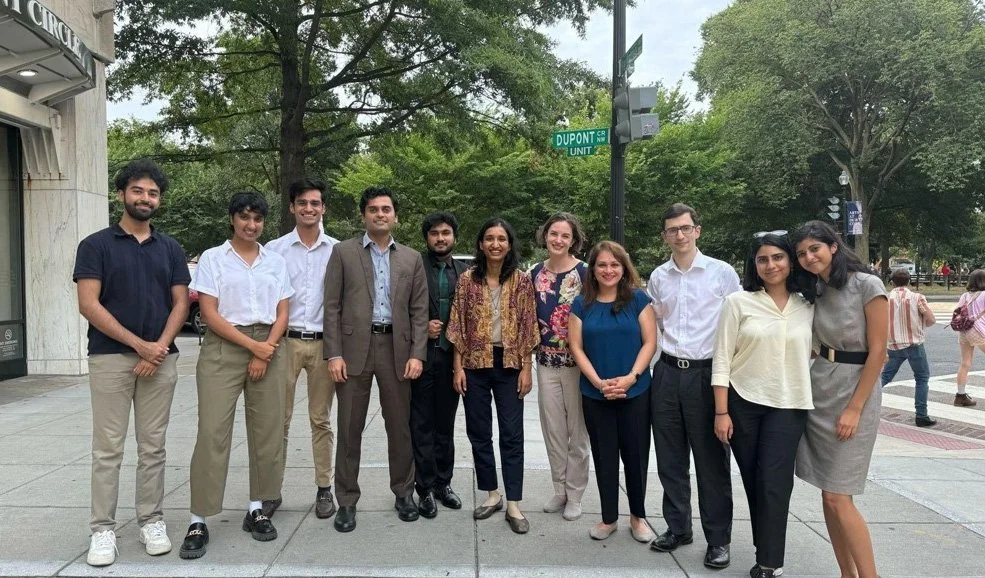A Glimpse into Policy Making in the Heart of Washington D.C.
Written by APF + Stimson Center Pakistan Fellow (2024) Eman Kamil Omar
I was selected this summer to serve as an APF Fellow at the Stimson Center’s South Asia Program. As someone who had just completed a master’s in journalism from Columbia University, immersing myself in the think tank world was not just a novel experience, but an eye-opening one where I learned so much about security issues in South Asia and how they affect the day-to-day minutiae of ordinary citizens.
As a journalist and storyteller, I have always been interested in a range of topics. While my career in Pakistan involved promoting the arts and culture of the country, and my time in New York was spent reporting on hyper local news stories, from social justice, education, and climate, Stimson helped me sink my teeth into the international security space.
Each member at the South Asia Program had unique research interests and it was refreshing to learn what everyone was working on. Being an APF Fellow allowed me to experiment with, and work alongside, some of the greatest minds on traditional and nontraditional security issues in South Asia. I was able to assist in in-depth research on counterterrorism operations, nuclear deterrence, and the impact of climate change in the Global South.
Studying the various ways in which the Global South suffers from climate crises helped me realize an idea for my research project. As someone from Lahore, Pakistan, a city that consistently ranks among the top 5 cities to be affected by smog, I knew I had to deep-dive into understanding the factors behind what was making the air in my city so unhealthy, and Pakistan a country so unlivable.
In my research, I learned that Pakistan is still burning imported fossil fuels to generate power – and this is not just contributing to smog and exacerbating the climate crises in the country but puts a stress on Pakistan’s foreign exchange reserves leading to circular debt. The Independent Power Producers (IPPs) in Pakistan, moreover, also thrive off generating electricity from fossil fuels as it is a quick method to making money, as opposed to investing in alternative, renewable energy sources such as nuclear, wind or hydropower. The Government of Pakistan also does not incentivize or encourage IPPs to move towards renewable energy. I linked the upcoming COP29 in Azerbaijan to the fossil fuel problem in Pakistan, and whether Pakistan’s environment can be salvaged with the debates and proposals that emerge at the conference in November.
Eman Kamil Omar
Being an APF Fellow allowed me to experiment with, and work alongside, some of the greatest minds on traditional and nontraditional security issues in South Asia. I was able to assist in in-depth research on counterterrorism operations, nuclear deterrence, and the impact of climate change in the Global South.
As a Pakistani citizen, it has also been an interesting experience to see how a think tank like Stimson places priority on various issues in Pakistan, and in the broader South Asian context. Every Thursday at noon, the South Asia Program used to convene over lunch to discuss a story or issue they had been following. During my three months here, we discussed protests in Bangladesh and the ousting of Sheikh Hasina, the constant uproar in Kashmir and nuclear escalation in the Indian Ocean Region and how that symbolized great power competition between the United States and China. The Thursday ‘Regional Lunch Updates,’ as we call them, were extremely stimulating and kept us all informed of the latest developments in the region.
Moreover, the South Asia Program at Stimson also encouraged me to leverage my journalistic skills in various projects. For example, I used my video editing skills to contribute to the editing and production of a trailer which is set to come out soon at the time of this writing.
I would like to end this blog post by thanking the South Asia Program at the Stimson Center, especially Sahar Khan, Elizabeth Threlkheld, Akriti Vasudeva, Zeba Fazli, Betzalel Newman, Uzair Sattar, Sania Shahid, Zachary Zimmerman, Elizabeth Zazycki and Omaer Naeem. I would also like to thank the American Pakistan Foundation Board Chair, Dr. Nasar Qureshi, and Henry Alphin for believing in my abilities and taking me on as a fellow.

